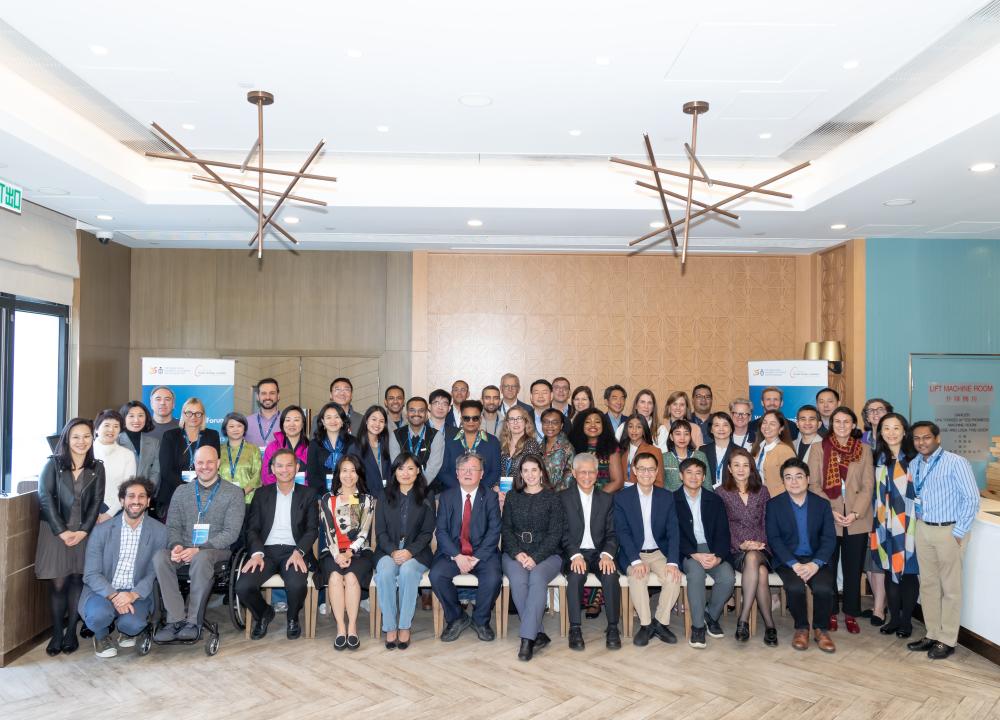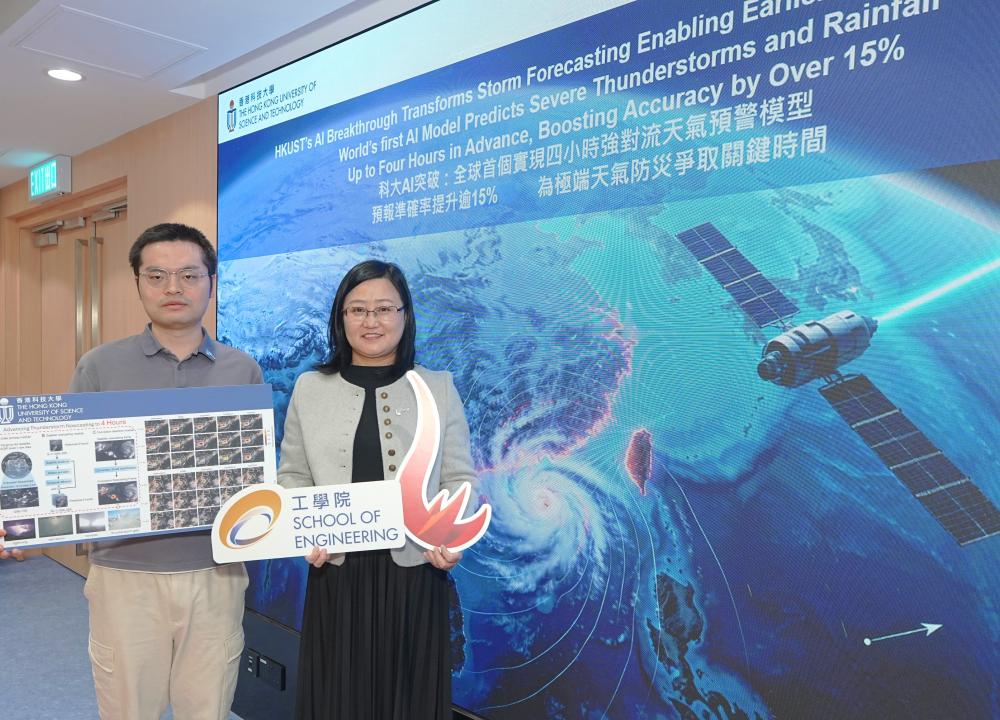News & Stories
2026

Stories
Exploring AI’s Next Frontier: HKUST and World Economic Forum Convene Young Global Leaders
From December 1 to 5, 2025, The Hong Kong University of Science and Technology (HKUST), in partnership with the World Economic Forum (WEF), hosted the 2025 edition of the prestigious Young Global Leaders Education Module.The flagship event, themed “Our AI Future is Now: Reflections and Next Directions,” brought together 35 influential young leaders from 24 countries and regions for an intensive exploration of artificial intelligence’s societal and economic implications. The program also served as a key milestone ahead of HKUST’s upcoming 35th Anniversary, underscoring the University’s commitment to fostering innovation-led global impact.

News
HKUST's AI Breakthrough Transforms Storm Forecasting Enabling Earlier Life-Saving Warnings
In a critical advance for climate resilience, researchers from The Hong Kong University of Science and Technology (HKUST) have developed an AI model that can predict dangerous convective storms—including Black Rainstorms, thunderstorms and extreme heavy rainfall like those that have hit Hong Kong—up to four hours before they strike. This world-first technology, developed in collaboration with national meteorological institutions and powered by satellite data and advanced deep diffusion technology, improves forecast accuracy by over 15% at the 48‑kilometer spatial scale compared with existing systems. This breakthrough strengthens the overall accuracy of the national weather forecasting system and promises to transform early warning systems for vulnerable communities across Asia.
2025

News
HKUST and SEMI Co-Host Inaugural 2025 Semiconductor Innovation and Intelligent Application Summit (SIIAS)
The Hong Kong University of Science and Technology (HKUST) and SEMI successfully concluded the inaugural 2025 Semiconductor Innovation and Intelligent Application Summit (SIIAS). As a prelude to the University's 35th anniversary celebrations and supported by the HKSAR Government, the landmark event made its debut in Hong Kong, attracting over 600 semiconductor industry leaders, leading researchers, key policymakers and students from Chinese Mainland, the United States, Saudi Arabia, Germany, Singapore, and beyond. The Summit focused on the latest technological advancements and global development strategies in the semiconductor industry, further solidifying Hong Kong’s position as an international innovation and technology hub. The event underscored HKUST's leadership in semiconductor research and its pivotal role in uniting government, industry, academia, and investors to drive advancement in the sector.

News
HKUST and Forum of Young Global Leaders, an Initiative of the World Economic Forum, Launch Immersive AI Dialogue
The Hong Kong University of Science and Technology (HKUST) is honored to host the Forum of Young Global Leaders 2025 for a five-day Education Module titled "Our AI Future Is Now." In its third year, this immersive program runs from December 1 to 5 on the HKUST campus and brings together close to 40 world's most promising young leaders and entrepreneurs to explore the transformative power of artificial intelligence (AI) across key industries.The module marks a prelude to HKUST's upcoming 35th anniversary celebrations. It will examine AI's profound impact – from its economic and scientific influence to its biomedical and cultural contributions. Participants will engage in expert-led discussions, interactive demos, and deep dive into topics such as AI-driven art-tech in revolutionizing the creative process.

News
HKUST and SEMI to Co-Host the 2025 Semiconductor Innovation and Intelligent Application Summit (SIIAS) – Premiering in Hong Kong on December 2
The Hong Kong University of Science and Technology (HKUST) is pleased to partner with SEMI to co-host the inaugural Semiconductor Innovation and Intelligent Application Summit (SIIAS) on December 2, 2025. Supported by the HKSAR Government, this landmark event will be held in Hong Kong for the first time, bringing together global industry leaders, pioneering researchers, and key policymakers to shape the future of semiconductor innovation and drive the industry's strategic development. The SIIAS will further establish Hong Kong as a global innovation hub for microelectronics and advanced manufacturing.
News
HKUST Launches AI Literacy Hub in Strategic Collaboration with Solomon Learning Group
The Hong Kong University of Science and Technology (HKUST) announced today a strategic collaboration with Solomon Learning Group (Solomon Learning) to establish the AI Literacy Hub (the Hub), a major initiative of artificial intelligence education in Hong Kong.The establishment of the Hub responds to the digital education initiatives outlined in The Chief Executive's 2025 Policy Address, and leverages HKUST's strong capabilities in AI teaching and research, along with Solomon Learning's extensive network, to enhance AI literacy throughout the Hong Kong community.The launching ceremony was attended by distinguished guests including Dr. CHOI Yuk-Lin, Secretary for Education of the Government of the Hong Kong Special Administrative Region of the People's Republic of China (via video format); Mr. Antony LEUNG, Chairman and Co-Founder of Solomon Learning; Ms. Alison CHAN, CEO and Co-Founder of Solomon Learning; and Prof. Nancy IP, HKUST President.
News
HKUST’s Groundbreaking "Major + X" Curriculum Equips Next Generation with AI and Sustainability Expertise
The Hong Kong University of Science and Technology (HKUST) has introduced its groundbreaking "Major + X" curriculum, a transformative academic framework designed to directly support Hong Kong’s development into a global AI hub and contribute to the national 15th Five-Year Plan's "AI+" initiative. By empowering students to fuse their core majors with high-demand fields like AI and Sustainability, the program is building a pipeline of talent capable of driving the scientific and technological revolution and industrial transformation called for in the national strategy. This initiative has already equipped more than 1,300 students with the hybrid expertise to tackle tomorrow's challenges.
News
Dr. LIU Cixin Leads HKUST Faculty and Students on a Venture into the Universe of The Three-Body Problem and the Frontiers of AI
Once, science fiction served as a prophecy of the future. Today, technology is transforming these visions into our lived reality at an unprecedented pace. As both an extrapolation of scientific frontiers and a realm of imagination, science fiction continually expands the boundaries of human understanding, while rapidly evolving technology constantly reshapes the form of science fiction itself. In these dual currents of progress, how will science fiction envision the future for us?








